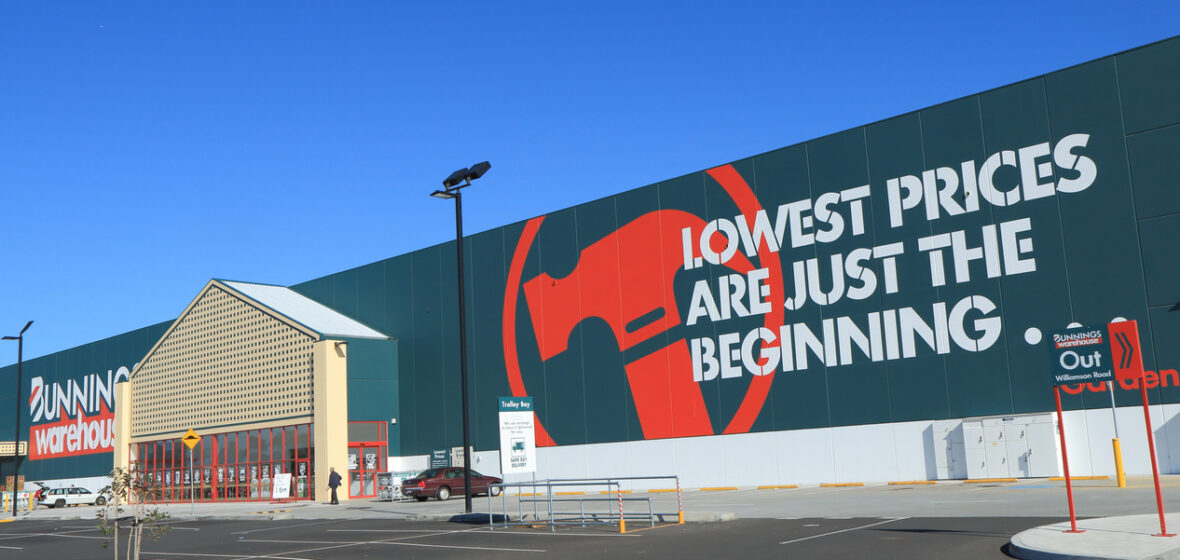The Bunnings price-beating guarantee has been the main focus of a recent news investigation, raising concerns that it is not in full compliance with regulatory requirements over home brand product marketing and consumer laws relating to anti-competitive behaviour.
The ABC’s 4 Corners conducted an investigation earlier this month, which claimed the “price guarantee” was effectively null on more than 9,000 products made exclusively for Bunnings because these products can’t be found elsewhere. The same investigation revealed that while Bunnings (owned by Wesfarmers) claims 17 per cent share of the hardware market, the number could be closer to 70 per cent.
The ACCC’s stance is that while it is not a legal requirement for retailers to provide explicit labelling to indicate a product is a home brand, it is deceptive or misleading to present a home brand product as that of a third party via marketing or labelling. It is not a concern unique to Bunnings. The ACCC has also cast an eye on Woolworths and Coles over their home brand alcohol products which do not overtly present as a home brand creation.
In a statement published by the ABC and on its own website, Bunnings Managing Director Mike Schneider wrote “Every day we work hard to earn the trust of our customers, suppliers and communities through a genuine commitment to value, service and fairness, and we don’t take that trust for granted.”
“Claims that we exclude our owned brands from our lowest prices policy or the application of our price guarantee are completely incorrect. The policy applies across like-for-like products, and we reduce prices on our owned brands or exclusive products where we identify a competitor’s similar product at a lower price,” he said.
“We are committed to delivering the best possible value for Australian and New Zealand households, with a mix of owned and well-known brands, underpinned by our everyday lowest prices policy and a strong focus on trust, transparency and fairness.
“We are also a human organisation and recognise that from time to time we don’t always get it right, however when we make a mistake we work hard to put it right as soon as we are made aware.”
Clinton Free is a professor of accounting, governance and regulation at The University of Sydney Business School. Free tells LSJ, “Bunnings has managed to dodge the regulatory spotlight, but it now dwarfs its nearest competitors like Mitre 10 and Home Hardware in the hardware and home improvement market.”
While Bunnings claims that it is in competition with a broad range of retailers, including Kmart and JBHiFi, which dilutes its market dominance, the research firm IBISWorld has estimated that Bunnings actually maintains a market share of just over 33 per cent in the hardware field.
Free explains, “Bunnings has cemented its position through rapid national expansion, exclusive supplier arrangements, tough supplier negotiations, a growing portfolio of private-label products, and strategic positioning near smaller, often family-run competitors. The result is a shrinking competitive landscape where independent and mid-sized retailers are increasingly pushed to the margins. And market dominance isn’t just a size issue – it can undermine pricing pressure, squeeze suppliers, and stifle innovation.”
Home brand products not inherently problematic
Home brand products, or private label products, are usually manufactured by third-party producers under contract with a retailer. A recent quarterly update from Coles supermarket revealed one in three customers had increased their spend on home brand products under a cost of living crunch. Home brand products are usually stocked lower on shelves or behind more expensive brands paying a premium for shelf space and in-store marketing. They are beneficial to consumers, but equally beneficial to retailers who avoid complicated contract negotiations with suppliers, logistics, and minimises exposure to risk and unforeseen costs. A January Finder survey of 1,013 people found that 39 per cent are switching to cheaper brands due to financial pressure.
In Bunnings’ case, their home brands encompass 9,000 products, such as Click electrical fittings, Matador barbecues, Saxon gardening products, Marquee outdoor furniture, Mondella toilets, and Happy Tails pet goodies. Typically, packaging does not indicate these products are manufactured exclusively for Bunnings.
In the written statement, Bunnings’ Schneider says “Bunnings owned-brands make up around 3 per cent of our nearly 300,000 home, commercial, and lifestyle products offered in-store, online and through our marketplace. ”
Australian Consumer Law requires home brand products to be clearly labelled and not mislead consumers about origin, quality, or equivalence. Bunnings’ private-label products, including brands like Matador Barbecues and Garden Basics, are often marketed as value alternatives but consumers may not always realise these are Bunnings home brands. While there’s no blanket prohibition on home branding, the law does require transparency and prohibits misleading conduct under the Competition and Consumer Act.
Free says, “Bunnings’ market share is highly contested. Bunnings’ claim of 17 per cent market share appears to be based on a very expansive definition of the market that includes garden centres, specialist retailers, and broad online sales. Others put Bunnings’ share at closer to 70 per cent in the core hardware and home improvement segment, which is far more reflective of where it dominates.”
The effect of significant market dominance is twofold. It directly affects consumers who cannot find a range of brands that are in genuine competition and thus do not have true choice in comparing prices. Secondly, the lack of competition in building and homewares products means that builders, designers, and tradespeople pass on the costs of products to consumers where there are no substantial alternatives to home fittings or furniture products, raising the costs of repairs, renovations, or new home builds.
Free says, “This level of concentration affects consumers in two key ways. First, reduced competition tends to drive up prices over time, especially in categories like tools, plumbing supplies, and fixings where Bunnings has less competition. Second, builders and tradespeople face fewer supplier options, meaning higher input costs that are inevitably passed on to households. So yes—the hit to consumers is twofold: at the register, and again in the rising cost of renovation and building services.”
A guarantee that can’t be fulfilled
Free says, “Bunnings offers a ‘lowest prices guaranteed’ promise: if a customer finds a lower price on an identical stocked item, Bunnings claims it will beat it by 10 per cent. However, a large percentage of Bunnings’ products are exclusive to the chain, including private-label items or specially supplied SKUs which naturally means there are no identical products available elsewhere to trigger the guarantee. As such, for a good deal of its product range, the guarantee is largely a mirage. This undermines consumer expectations and raises questions about whether the guarantee creates a misleading impression of price competitiveness.”
Then, there’s the media revelation that suppliers allege Bunnings is not dealing with its suppliers in a wholly transparent, fair way. Bunnings has rejected this assertion and said in a statement it has long-standing and strong relationships with suppliers.
Free tells LSJ, “As the 4 Corners investigation revealed, Bunnings has entered into exclusivity agreements for some of its flagship sites, effectively locking out competitors from prime retail locations. Smaller retailers have also reported numerous instances of Bunnings opening stores in close proximity to established independents, sometimes right next door. While opening a store near a competitor isn’t illegal, when it’s paired with Bunnings’ immense buying power and supplier control, it starts to resemble a strategic use of dominance that could fall foul of Section 46 of the Competition and Consumer Act, which prohibits the misuse of market power.”
He adds, “Given the volume and consistency of complaints across a range of domains, there’s a case for a sector-wide inquiry, much like the one we’ve seen in the supermarket industry, to determine whether current laws are sufficient to protect competition and suppliers.”
Is an investigation imminent?
Consumer and competition law fall under the Competition and Consumer Act 2010 (CCA), including Schedule 2 (or Parts 6 and 7), the Australian Consumer Law (ACL). The CCA is focused on fair trading and competition through banning anti-competitive behavior and ensuring guarantees and warranties that protect consumers. The ACCC responded to an LSJ question over an investigation into Bunnings’ price guarantee conduct, saying the organisation does not comment on current investigations or potential and intended investigations. The ACCC website refers to business behaviours that “may be illegal”, including behaviour that “has the purpose, effect or likely effect of substantially lessening competition in a market.”
For its part, the ACCC also says:
“Competition is substantially lessened when, as a result of the business’s behaviour:
- the business’s competitors are restricted from competing effectively
- the business is able to significantly and sustainably increase its prices
- it would be very hard for a new business to set up and start competing.”
Free says, “There’s clear precedent in the grocery sector. The ACCC has previously taken both Coles and Woolworths to court for unconscionable conduct toward suppliers, and just this year, its final report on supermarkets warned of excessive market power, lack of price transparency, and supplier pressure. That review led to a beefed-up Food and Grocery Code of Conduct (which Bunnings is not subject to) which now demands fair dealing, good faith, and transparency in everything from pricing to delisting products.”
Bunnings fell foul of the Australian Privacy Commissioner
In October 2024, the Australian Privacy Commissioner, Carly Kind, determined that Bunnings Group Limited (Bunnings) interfered with the privacy of individuals through its use of a facial recognition system for security and loss prevention purposes across 62 stores in the period between January 2019 and November 2021, breaching the Australian Privacy Principles (APPs).
Bunnings’ dominance has been decades in the making. Founded in West Australia as a timber company, it wasn’t until the early 1960s that it evolved into a retail operation. By 1994, it had established its first warehouse and began buying up smaller hardware brands like McEwans and BBC Hardware (known as Hardware House).
In a New Zealand case in June 2023, the Commerce Commission fined NGB Properties Limited (NGB) $NZD500,000 for an anti-competitive covenant that it placed on a site close to Mitre 10 MEGA Tauranga, which is operated by NGB. NGB had been attempting to prevent Bunnings from opening a Bunnings Warehouse in the area. The NZ Commerce Commission had been focused on restrictive competition within the fuel, groceries and residential building supplies markets.
Commerce Commission Chair, John Small, commented: “Land covenants can harm competition by raising barriers to entry or expansion in a particular market, making it harder for competitors to compete effectively and gain scale.”
He added, “In this case, the covenant was intended to stop Bunnings, a competitor to Mitre 10, from building close by which would deprive Kiwis in Tauranga of the benefits that might have come from a more competitive local market for DIY and building supplies.”
The ACCC has previously looked into “land banking” by supermarkets. This is where Coles, Woolworths, or Aldi purchase leases on prime retail ground to prevent their competitors from setting up in close proximity to their existing stores. In 2009, the ACCC announced that “an agreement had been reached with Coles Group Limited and Woolworths Limited to phase out all restrictive provisions in supermarket leases.”
Both companies undertook to cease restrictive provisions in any new supermarket leases that required the shopping centre or landowner to reject a subsequent lease arrangement with a competitor. Since 2009, no restrictive leases are allowable, with the phasing out period ending prior to 2020.
Federal treasurer Jim Chalmers told the ABC, “I’m aware that people have raised concerns about Bunnings. Our primary focus is supermarkets, but we’ve given the ACCC the resources that they need and the ability to recommend to us a broader focus, if that’s warranted.”




